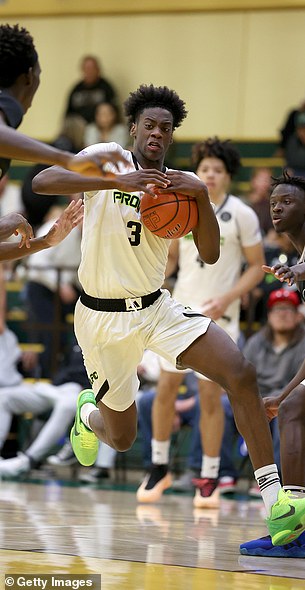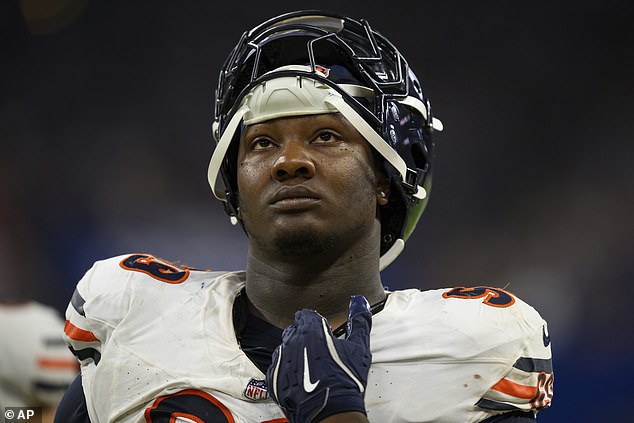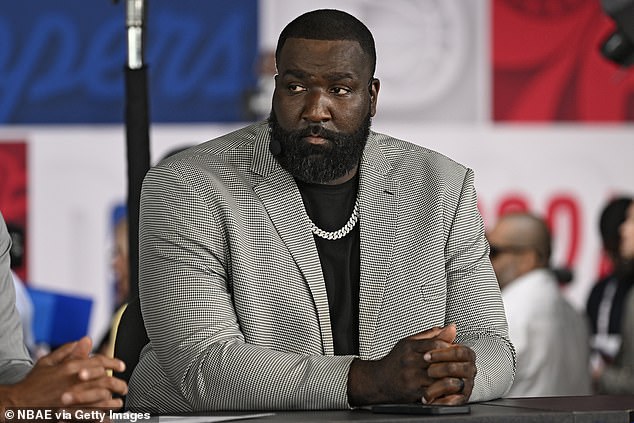ESPN host and former NBA star Kendrick Perkins is facing backlash over a new startup that is being compared to a “predatory” lender.
Perkins, the 39-year-old basketball analyst, is partnering with Wall Street investor Chris Ricciardi on Nilly, which offers college athletes money up front in exchange for future name, image and likeness (NIL) earnings.
The problem, according to an expert who spoke to ESPN about the company, is that Nilly could lead a vulnerable group of young people to obtain predatory loans. So far, Nilly has deals with just 20 men’s soccer and basketball players, all of them at the college or high school level.
“These are shoddy products designed to take advantage of young children,” said Chris Peterson, a Utah law professor and former adviser to the Consumer Financial Protection Bureau. he told ESPN.
ESPN’s Dan Murphy obtained a copy of a contract from Nilly that offers a $50,000 payment to a high school senior in exchange for exclusive NIL rights over a seven-year period. Additionally, Nilly will earn a quarter of that athlete’s NIL for the duration of the deal or until Nilly earns $125,000, 2.5 times his original investment.
ESPN host and former NBA star Kendrick Perkins faces backlash over new startup
And according to Ricciardi, Nilly can earn up to 50 percent of an athlete’s NIL money, although a company spokesperson told ESPN the share can be as low as 10 percent.
NIL deals have been permitted by the NCAA since 2021 and allow fans to earn third-party sponsorship money without jeopardizing their eligibility. But it was not until recently that these agreements could be grouped into other agreements, such as those promoted by Nilly.

AJ Dybantsa, the country’s top basketball recruit, will earn millions in NIL deals
Ricciardi emphasizes that the contracts are not loans, but licensing agreements, which protect athletes from default. Instead, he explained, the agreements are more like upfront payments that musicians and authors receive for a share of future royalties.
“There is no interest rate,” Ricciardi said. ‘There is no obligation to return the money. It is purely a licensing agreement. I’d be surprised if these people think that music advances are high-interest loans.
But not everyone agrees with Ricciardi.
Michael Haddix Jr., who teaches financial education seminars to university athletic departments, described the agreements as “predatory.”
“To me, it feels like you’re taking advantage of people who need the capital now and using it to cloud their focus going forward,” Haddix Jr. told ESPN. “It feels predatory and is taking advantage of young people who need money and haven’t thought about the long-term implications.”
Advance NIL co-founder Courtney Altemus, who consults with athletes and schools, recommends that students stick to shorter agreements to avoid unforeseen problems. Additionally, he says, athletes need to do the math themselves to understand the impact of this decision.
“They don’t understand until they see the numbers,” Altemus said. “They’re going to have to make their own decisions, but we really want to make sure they understand how much they’re really paying to have access to that money sooner.”

Gervon Dexter to pay 15 percent of his future NFL earnings to Big League Advantage
Naturally, Perkins has defended the company.
Perkins, a former Texas high school star who jumped straight to the NBA in 2003, sees Nilly as a way to reduce costs for low-income families.
“There are so many athletes and their parents who are struggling day to day,” Perkins, the ESPN analyst, told ESPN. “Because we’re actually risking a little bit of what the student-athlete is going to earn in the NIL space, the benefit is that the child, the student-athlete, can gain financial security, so they can’t do that.” I don’t have to rush.
And while most NIL deals are four- and five-figure deals for relatively unknown athletes, the numbers rise considerably when top recruits are on the line.
AJ Dybantsa, one of the country’s top basketball recruits, could receive between $7 million and $9 million in NIL money, according to veteran college basketball reporter Jeff Goodman. And although it is not known if Dybantsa has any agreement with Nilly, said player could end up paying millions and millions to the startup under the aforementioned contract.
Similar ventures already exist in baseball, where prospects are often paid for a portion of their future earnings.
One such company, Big League Advantage, has recently moved into the NIL market, where a similar company, Vestible, was already operating. Both companies have paid college football players hundreds of thousands of dollars in exchange for future NFL earnings.
In a deal, former Florida defensive lineman Gervon Dexter will pay 15 percent of his future NFL earnings to Big League Advantage after the Chicago Bears rookie received $436,485 during his college days.


